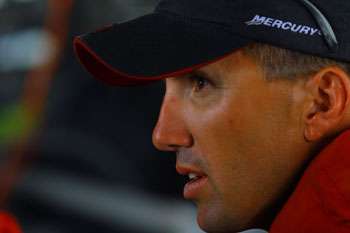
Oklahoma pro Edwin Evers had just finished 61st in the Bassmaster Elite Series opener at the Harris Chain of Lakes near Leesburg, Fla. In all of his tournament experience in the Sunshine State over the years, he'd only collected two checks.
Evers isn't alone. Historically, Florida tournaments tend to be very difficult for the nation's top bass pros, and with the opening two events of the 2008 Elite Series in Florida, many were simply hoping to get through the two events with as many AOY points as possible, regardless of whether or not they earned a check.
Why is Florida so difficult?
"Everything tends to look the same, and there's miles and miles of it," explains Evers, "so we simply can't figure out where the bass are. When we do catch one, we can't figure out why it's there."
Because virtually all the fishing is in extremely shallow water — usually two to four feet deep or less — everything is visually oriented. Pros like Evers who depend on their electronics to locate depth changes have their best tool taken away.
Instead of looking at depthfinders, the pros are forced to study vegetation and become identification experts. More often than not, Florida's bass will relate to one specific type of greenery and not to any of the others, and several types of vegetation will frequently be growing together. Fine-tuning a vegetation pattern like that isn't as easy as it sounds, either.
"Another problem we have is that because the fish are shallow, they tend to be very spooky, and heavy boat traffic and trolling motors will slow the bite down drastically," Evers continues. "Most pros tend to fish very fast, simply to cover a lot of water, because we know when we get a couple of bites in an area we've probably located a school of fish.
"In Florida, we can't fish fast so we don't cover that much water. In the shallow vegetation with spooky fish, we normally have to fish soft plastics, which are basically slow moving lures anyway."
Adds Steve Daniel, who moved to Florida and began guiding on Lake Okeechobee in 1984, "Most of the visiting pros haven't developed the patience it takes to fish slower down here. Even when the bass are biting well, you still have to take your time."
Daniel also notes that the Florida-strain of bass tend to be more susceptible to weather and water conditions, especially fast changes, which also makes them reluctant to bite.
"It was a hard lesson for me to learn when I first moved to Florida," he says, "but when a cold front hits down here, you don't usually down-size your lures and fish even slower. You do just the opposite, fishing larger lures and retrieving them faster.
"The bass in Florida have a very specific diet, so you have to make whichever lure you use look severely injured if you want to get their attention. Bass are predators so they'll go after something injured, regardless of whether or nor they're hungry.
"Overall, however, I think the biggest problem I see with pros when they come to Florida is a lack of patience,"concludes Daniel. "They need to go into a specific area and fish it carefully and thoroughly and just look for five bites."
